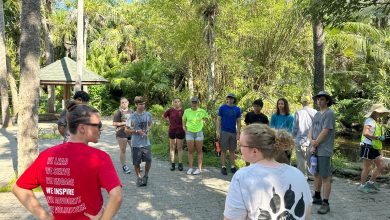What being a woman in STEM means to a young leader in astrophysics
Women in STEM is an interview series centered on the issues, ideas and inspiration relevant to Florida Tech women in STEM – Science, Technology, Engineering and Mathematics.
Brooke Adams is a Florida Tech student blogger, astronomy and astrophysics major and guinea pig for our new Women in STEM series. Brooke was one of the first student bloggers we hired a few years back and it’s been really inspiring to follow her journey at FIT through her posts.
Her passion and enthusiasm for astronomy and astrophysics was evident from her first post and continues to grow as she approaches graduation. Her dedication hasn’t gone unnoticed, Brooke was recently awarded the Society of Physics Students Leadership Scholarship, beating out applicants from across the country.
To kick off the series, we asked Brooke for her insights into what it means to be a woman in STEM today.
Why do you think STEM careers are important, and what role can women play in them?
Women in STEM careers work hard to solve problems the world is facing and can provide their own unique perspective on solutions. Whether people want to admit it or not, men and women think very differently. Just as companies have realized adding people from numerous backgrounds helps stimulate creativity on the work force, women can work collaboratively and add their own thoughts and experiences.
What inspired you to pursue a STEM education?
I’ve always wanted to go into science. I think it may have started when I witnessed a partial solar eclipse when I was really young. I couldn’t understand how something could make the Sun go out like that, and it made me want to know more! I read a bunch of space magazines for kids, visited children’s natural history museums, attended air shows, and I even got to shadow my dad at his job with the Department of Defense. By the time I got to senior year of high school, I already knew I wanted to do science; the hard part was just figuring out which branch to go into. I eventually chose physics over biotechnology because of a really cool black hole presentation at the New York Natural History Museum, but I never really wanted to do anything outside of STEM.
What do think are some of the most shared/common challenges women in STEM fields encounter?
Well, the male/female ratio can be intimidating to some women. I have also heard stories at the Conference for Undergraduate Women in Physics (CUWiP) about women encountering professors/employers who don’t think women should be in technical fields, and treat them less than fairly. There can also be problems if a women wants to have a family; taking some years off for that could pose a problem getting back into the work force, and when you couple that with men who think women shouldn’t have technical jobs… I can’t say I’ve actually seen any of this myself, but I have heard some rather terrifying stories! Hopefully we’re moving into an era that is more accepting of women.
Knowing what you know now, what advice would you give your younger self?
Learn about computers, software and hardware. Everything requires computers nowadays, and it would have been great if I had known something about programming before coming to college.
What is one takeaway you would want to impart to a young woman thinking of pursuing a career in STEM?
It sounds hard, and it will be, but your future job will give you the opportunity to help the world in some way. You can do anything if you really set your mind to it, and if you find you aren’t enjoying a certain aspect of it, there’s nothing wrong with switching to a different branch of STEM!
[pullquote]Find what you’re passionate about, and you’ll lead a very fulfilling life.[/pullquote]
In your experience, what are the top things leaders could do to encourage more young women to enter STEM fields?
Show them science and math aren’t scary. That would work best at a younger age, probably best in grade school. In school, I remember doing a lot of reading, writing, comprehension, geography, history, etc… And of course we did math and a little science. But it was rarely anything interesting, just “here’s an equation, do this to get the answer” or “when we eat food, our stomach digests it”.
[pullquote]Simple experiments to show basic science concepts would go a long way to get students interested in STEM fields.[/pullquote]
I went to a family science day during my internship at the Air Force Research Laboratory, and the kids got so excited over simple things like a laser through a lens, Newton’s cradle, oil and water in a bottle, and so forth. When I first did corn starch and water, I was so fascinated. Then the teacher needs to explain the science behind it (correctly, of course). For women older than grade school age, I’d say it’d help to let them know what kind of fields and jobs are available out there. “Computer science” doesn’t mean gaming or building computers, “chemistry” isn’t about building bombs.
[pullquote]There are so many possibilities out there, but I never knew about them until I went to college and even now, I’m still discovering new fields I had never heard of.[/pullquote]
If you are a woman in STEM, whether a faculty member, student or alumni, I want to hear from you! Email me at efox@fit.edu to be featured on Women in STEM.





